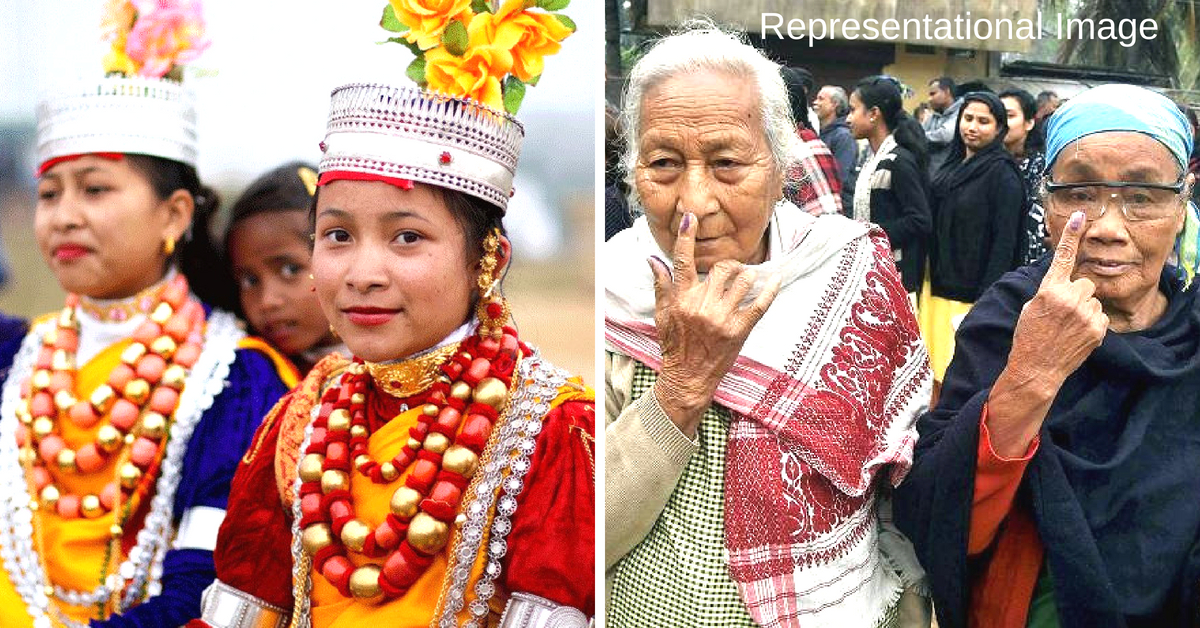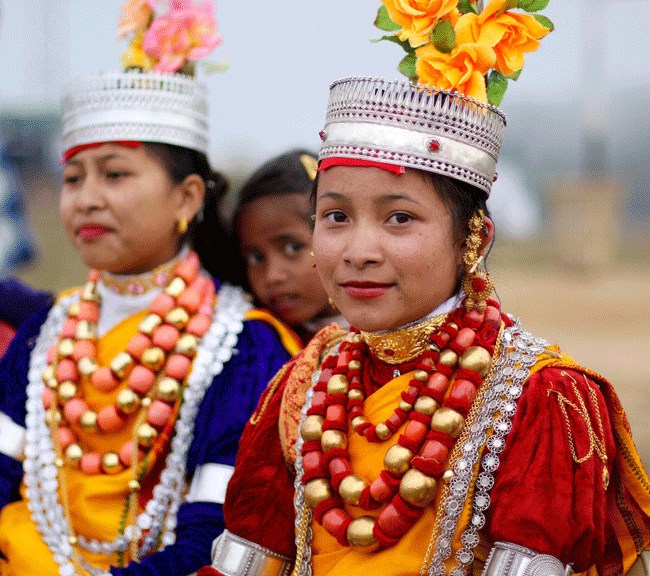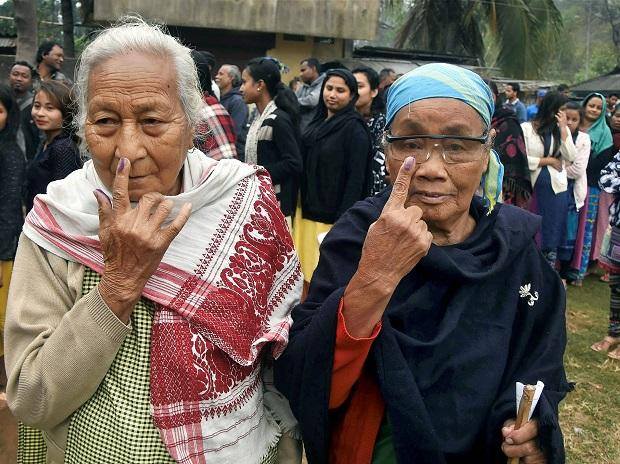Khasi Women in Matrilineal Meghalaya Are Up In Arms: Why This Outrage is Justified
"This decision to discriminate against woman is more like a Khap Panchayat in our backyard waiting to pounce on women."

In an unfortunate turn of events for women from the Khasi tribe of Meghalaya, the Khasi Hills Autonomous District Council (KHADC) unanimously passed a bill denying them their Scheduled Tribe status and its consequent benefits, if they marry someone outside the tribe.
Moreover, children of Khasi women who marry outside the tribe would also be deemed non-Khasi.
As the controversial provision of the Khasi Hill Autonomous District (Khasi Social Custom of Lineage) (Second Amendment Bill) 2018, reads:
“Any Khasi woman who marries a non-Khasi, as well as her offspring born out of such marriage, shall be deemed as non-Khasi who shall lose the Khasi status and all privileges and benefits as a member of the Khasi tribe who cannot claim preferential privileges under any law.”
To convert this bill into law, all that remains is the consent of the Meghalaya governor. This isn’t Parliament or the State Assembly passing a bill, but an autonomous district council.
How is that possible?
Under Schedule 6 of the Constitution, which makes special provisions for the administration of the tribal-dominated areas in the states of Assam, Nagaland, Meghalaya and Mizoram, autonomous regional and district councils have the power to pass legislation on a whole host of subjects including land use, forest and water management, social customs and marriage.
For further context, it’s imperative to note Khasis are among the three major tribes of Meghalaya—the other two being Garo and Jaintia, which are matrilineal societies.

In these communities, children inherit their mother’s surname, while the youngest daughter typically inherits the largest share of ancestral property. Moreover, these communities are listed as Scheduled Tribes (ST), which gives them reservations in government jobs and universities, among other benefits.
Another critical facet of Khasi society one must understand is that children of Khasi women who marry non-Khasis naturally take the name of the mother’s clan.
However, for Khasi men marrying outside their tribe, a particular ceremony called ‘tang jait’ is performed whereby his children are assimilated into the matrilineal structure.
According to elected officials at the KHADC, the bill aims to protect Khasi people from the apparent ‘threat’ to their tribal identity by those who ‘misuse’ their custom of lineage.
Speaking to the media yesterday, HS Shylla, the chief executive member of the KHADC, said, “It is a very simple Bill to put a stop to mixed marriages as they are a threat to our tribe. It will not be retrospective and won’t affect mixed marriages that took place earlier.”
Why are women specially targeted in this bill? What about Khasi men?
Shylla claims that the KHADC could soon pass a similar bill for Khasi men, but the number of them marrying women from non-Khasi communities is “very negligible” while the same cannot be said of women.
“We will meet the chief minister early next month and ask him to expedite the process of giving the Bill a nod from the Governor’s office,” he told members of the press.
This has created an uproar among many Khasi women with many of them calling it “misogynistic,” “patriarchal,” “biased,” “unfair” and “unconstitutional.”
Moreover, they believe that this bill is evidence of the deep-seated patriarchal ethos that sits beneath its claim of matriliny.
“This decision is more like a Khap Panchayat in our backyard waiting to pounce on women. For the information of many supporters of the bill, many Khasi men too oppose the bill and are surprised that such a hasty bill was passed.
“No doubt there is a rising concern about the future and safety for indigenous tribes, even by those not belonging to this particular Scheduled Tribe. But outcasting women from their Fundamental Rights is unconstitutional and violative of their personal rights. Tribal women have a right to choose their partners in life and do not need a Khap Panchayat like diktat to stop them,” says Agnes Kharshiing, a leading human rights activist from Meghalaya, in an impassioned Facebook post.
Also, how this bill passes the scrutiny of this country’s higher courts remains to be seen since the bill is violative of Article 14 of the Indian Constitution, which relates to Right to Equality—a Fundamental Right.

Denying women, on the basis of gender, privileges and benefits that their tribal identity offers them is exceedingly problematic and unlikely to stand the scrutiny of the courts.
Moreover, in 2012, the Supreme Court passed a ruling on the legal implications of a tribal woman marrying an upper caste man.
“In a marriage between a tribal woman and a forward caste man, the offspring will get tribal status if the child is brought up in the mother’s environment and will be entitled to a reservation,” the court said, according to this report in The Hindu.
Besides the legal implications of such a bill, there are other forces at play.
Also Read: A Look at the Matrilineal Khasi Tribe of Meghalaya
With elections to the KHADC slated for early next year, elected officials are pandering to the male Khasi population, while posturing on the subject of ‘protecting’ their tribal identity. In fact, there are men’s rights organisations in the state who seek to overturn the Khasi matrilineal system.
Admittedly, many erstwhile communities living across our frontier regions, which were once isolated from the Indian mainland, are coming to terms with the influx of outside cultures.
Not just Meghalaya, but even in regions like Ladakh, there is a perception among locals that their traditions, customs and way of life are coming under threat. These are understandable fears, but also a natural outcome of greater inter-connectedness—a feature of modern society.
While the preservation of tradition is an admirable objective, it cannot come at the cost of embracing change. Moreover, it cannot come in the way of women exercising their own choice.
(Edited by Gayatri Mishra)
Like this story? Or have something to share? Write to us: [email protected], or connect with us on Facebook and Twitter.
NEW: Click here to get positive news on WhatsApp!
If you found our stories insightful, informative, or even just enjoyable, we invite you to consider making a voluntary payment to support the work we do at The Better India. Your contribution helps us continue producing quality content that educates, inspires, and drives positive change.
Choose one of the payment options below for your contribution-
By paying for the stories you value, you directly contribute to sustaining our efforts focused on making a difference in the world. Together, let’s ensure that impactful stories continue to be told and shared, enriching lives and communities alike.
Thank you for your support. Here are some frequently asked questions you might find helpful to know why you are contributing?


This story made me
-
97
-
121
-
89
-
167











